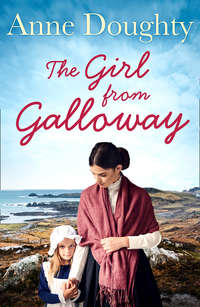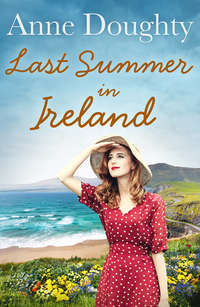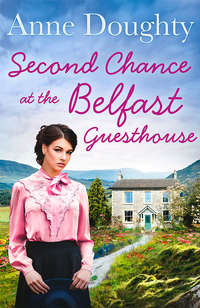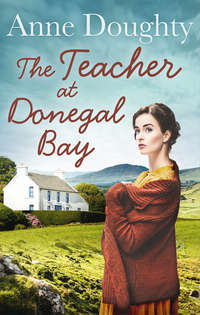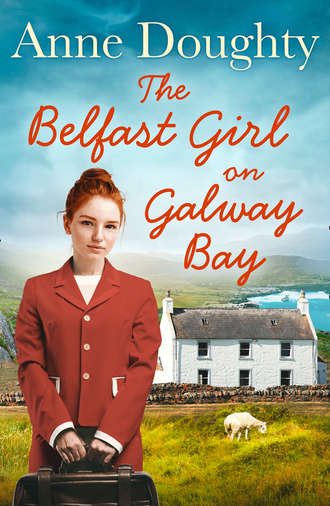
Полная версия
The Belfast Girl at O’Dara Cottage
I moved away in case my presence would disturb them and began to examine the contents of the long, low-ceilinged room. A solid wooden counter ran the whole length of one side. Behind it, shelves filled with packets and boxes rose to the ceiling, except at a central point where a large clock with dangling weights ticked out the separate minutes of the day. Against the counter leaned bags of dried goods, barley and rice, lentils and oatmeal, each with its polished metal scoop thrust into the mouth of the sack ready to measure into the pan of the shiny brass scales on the counter. Beyond the end of the counter, a low-arched doorway led into a passage which gave access to the stable yard outside.
On the opposite wall was the bar. Empty now. But the fluorescent light was on. It reflected in the rows of bottles and glinted off the well-polished seats of the high stools. At the furthest end of the bar, a new Italian coffee machine had just been installed. It sat, still partly draped in its polythene wraps, looking across the worn floorboards to a stand of Wellington boots and a rack of Pyrex ware.
I wandered around slowly. Who would buy the bottles of DeWitts Liver Pills, the mousetraps with the long-life guarantee, the shamrock-covered egg-timers, the hard yellow bars of Sunlight soap? And what would the same people make of the contents of the freezer, tucked between a pile of yard-brushes and a display unit of the blue and white striped delft I’d met at the cottage. Prawn curry. Chicken dinner for two. French beans and frozen strawberries. Unlikely substitutes for the bacon and cabbage, the champ, or the stew Mary had cooked for our supper on these last evenings.
Below a small counter laid out with newspapers and magazines, I found some exercise books. The notebooks I’d brought with me were filling up rapidly and these had the wide-spaced lines I liked. As I turned one over to look for the price, I heard voices in the passage leading to the stable yard.
‘Now don’t worry, Moyra. You concentrate on Charles and I’ll see to the stock. Paddy knows what’s needed here and Mrs Grogan won’t let you down in the hotel.’
There was a woman’s voice too, light and pleasant but further away.
‘I’ll come in this evening to make sure all is well, but I won’t come up to you. You look tired yourself.’
The voice intrigued me. It had something of the intonation of the voices I’d been hearing all around me since I arrived, but it was more formal. With her sharp ear for social distinctions, my mother would pronounce the owner either ‘educated’ or ‘good class’, depending on the mood she was in.
‘Are you all alone, Kathleen?’
I glimpsed the figure who strode across the empty shop to where Kathleen had just closed the door behind Mrs McGuire. I busied myself with the stand of postcards as he followed her glance.
‘It went quiet a wee while ago, so I let May and Bridget go for their tea,’ she explained. ‘They hardly got their lunch atall we were so busy. It’s teatime in the hotels, that’s why it’s gone quiet.’
He nodded as he listened to her. I had the strange feeling he was watching me out of the corner of his eye. A rather striking man. What some people might call handsome. A strongly shaped face, rather tanned, dark, straightish hair. He seemed to tower over Kathleen who was about my own height.
‘I’ve been talking to Mrs Donnelly and I’ve told her I’ll take care of the stock till Mr Donnelly is better. Would you let me have a note of anything you can think of. It’s so long since I’ve done the ordering I shall probably be no good at all.’
Kathleen laughed easily at the idea and said she’d start a list right away. He moved towards the door leading out into the Square and then, as if he had forgotten something, he turned and walked back towards me.
‘I’m afraid the selection isn’t very good,’ he said, as I looked up from the postcards. ‘We’ve some new colour ones on order from John Hinde, but there seems to be some delay.’
His eyes were a very dark brown and he was looking at me carefully, as if he was possessed by the same curiosity I had come to expect, but was too well-mannered to let it show.
‘I don’t honestly think they do justice to the place,’ I replied, nodding at the inexpensive sepia cards on the stand. ‘I’m glad you’re getting the John Hinde, he’s done some very good ones of Donegal.’
‘But you don’t come from Donegal, do you?’ he replied promptly. ‘I’d have thought it was more likely to be Armagh or Down myself.’
I had to laugh. Partly because it’s a game I play myself, placing people by their accent, and partly because he was so accurate. Even after growing up in Belfast, my accent hadn’t lost the markings of my earliest years when we lived with my grandparents down near the Armagh-Monaghan border.
‘You’re not far wrong,’ I admitted, smiling at him. ‘Very near in fact, but I live in Belfast now.’
‘Yes,’ he agreed, ‘and you’re staying with Paddy and Mary O’Dara at Lisara.’ He held out his hand and made me a small bow. ‘Miss Elizabeth Stewart, I presume. Patrick Delargy at your mercy.’
‘How on earth did you know that?’
His hand was warm and firm and he was smiling broadly.
‘Kathleen, come over here a moment Come and meet the lady herself. Does she answer the description we had of her?’
Kathleen hurried over.
‘Oh, miss, you made us all laugh, you did indeed. Didn’t you put the fear of God into Michael Feely on Sunday. I hear he’s not the better of it yet.’
Patrick Delargy leaned himself comfortably against the side of the freezer. ‘I missed all the fun,’ he said sadly. ‘Kathleen had better tell you the whole story.’
‘Ah miss, poor Feely came in here on Sunday evening and we thought he had seen a ghost,’ she began, her face horror-stricken.
I was so worried by the look on her face and the thought that I’d upset Michael Feely that I turned to Patrick Delargy to see how he was reacting. He appeared to be enjoying himself thoroughly.
‘He came in here,’ she repeated, ‘and the bar full and he swore he had met a witch.’
Her tragic expression crumpled and she giggled. Patrick Delargy shook his head. ‘Now, come on, Kathleen, this won’t do. Tell Miss Stewart the story the way you told me.’
With an effort, Kathleen gathered herself.
‘Yes, indeed. A witch. That’s what he had met. And it took two large whiskeys before he could go on.’
I opened my mouth to protest, but Patrick Delargy held up a warning finger. Kathleen was not to be interrupted.
‘He said that he had taken a student out to Lisara, a nice enough young lady and very well-spoken. And he says that she told him she had never been in the place before and didn’t know anybody and didn’t even know if the place was still there. And he said he believed her, for she was a very nice young lady and good-looking forby.’
She nodded towards me as much as to say, ‘Now there’s a compliment for you.’
‘And then he says, he takes her out to look for this place she’s never been to and the next thing is that she starts to tell him where every house and tree is and where he can park his taxi. And she knows every stone and bush of the place as if she’d been born and reared there.’
‘But I’d only been reading the map . . .’
‘Ach, sure, what would Michael Feely know about maps, miss? The man has no wit.’
Patrick Delargy was watching us both, a broad grin on his face. ‘What about bewitching Paddy O’Dara?’
‘I was coming to that, Mr Delargy, I hadn’t forgotten atall,’ she reprimanded him.
‘Apparently, miss, you went into O’Dara’s cottage with Paddy, and you’d never set eyes on the man before. No relative, not even a far-out friend, and the next thing, back you come with Paddy as meek as a lamb to carry your case and you to stay for three weeks.’
Kathleen could certainly get value out of a story. When she imitated the look on Feely’s face, I had to laugh myself.
‘I do hope I didn’t really upset him. I did try to explain. But he does jump to confusions, doesn’t he?’
‘He does that, miss. Whatever way you would put it plain, he always gets the wrong way of things.’
‘But it was a serious case,’ added Patrick Delargy, the light in his eye at odds with the soberness of his expression. ‘I’m not sure how many whiskeys he was bought to help him over the shock and to elicit the full extent of his distress.’
‘I think at one stage he thought I was going to write a book about his hotel,’ I offered.
‘Oh, he did, he did indeed,’ Kathleen nodded vigorously, as the shop door opened and two girls in blue overalls appeared, followed by a group of visitors and a cluster of children. She left us to go back behind the counter. Patrick Delargy looked at me quizzically.
‘And how are you proposing to get back to Lisara, Elizabeth? By broomstick?’
There were grey hairs on his temples and above his ears. His tie was one of those tweedy, handwoven ones with little irregular blobs of colour where the thread is thick. Like the one I’d nearly bought George for his birthday. Lucky I hadn’t. When I showed him one in a shop window, a lovely yellowy mix, he said it looked just like scrambled egg.
‘No, actually,’ I replied, glancing at my watch, ‘I must get a move on. The meat for supper’s here in my bag, and I still have bacon to get from Kathleen.’
‘Right. You get the bacon and I’ll bring the car round. It’s going to rain long before you get to Lisara. You do know about witches and water, don’t you?’
Without another word, he disappeared down the passage and into the stable yard.
The car was the largest I had ever seen. It was American and very new. The front seat was long and squashy and the shelf above the dashboard wide enough to lay out a whole picnic. When Patrick Delargy settled himself behind the wheel, his solid frame seemed somehow smaller and a remarkably long way away. He drove slowly out of the Square, manoeuvred round a pony and trap abandoned in the middle of the road, paused for a group of visitors who appeared quite unaware they were strolling on a main road and stopped twice for pedestrians who simply crossed the road without looking.
I remembered an article I’d once read in a women’s magazine about assessing a man’s character by the way he drove. Patrick Delargy certainly scored well on patience. I saw him relax as he turned right at the crossroads beyond the wells.
‘This is not exactly the best car for driving through Lisdoonvarna in September, I fear,’ he said with a slight, apologetic smile.
I was puzzled by the car. The best word to describe it was opulent. And that was right out of key with its owner who was in no way opulent, either in dress or in manner.
‘Well, it is rather large,’ I agreed cautiously.
‘Large, oversprang, difficult to handle and expensive to run. It was also a gift. What would you do?’
‘I see the problem,’ I began sympathetically. ‘I used to have an aunt who gave me the most ghastly blouses for Christmas. I always had to wear them when she came to visit so as not to hurt her feelings. I do wish people would just sometimes ask what you really want and not just assume they know.’
He looked at me briefly but very directly, something he had done several times already. I was beginning to find it most disconcerting. Until I came to Lisara, I had found few people ever bothered to look at me and even fewer who paid the slightest attention to my reactions. As I met his gaze I knew I’d spoken far more sharply than I intended.
‘Don’t people ask you what you want either, Elizabeth?’
‘No, not usually. My family all seem to know exactly what I want without any help from me. They then get upset if I point out that it’s not what I want at all.’
‘And what happens then?’
‘Oh, a row of some sort.’
I couldn’t for the life of me see how we’d managed to get ourselves into a conversation about my family. I was anxious to change the subject.
‘Was it your family’s idea that you came to Lisara?’
‘You must be joking.’
‘Well, I did rather wonder. Most of the Ulstermen I know think the west is a wild, barbarous place.
‘Do you know many Ulstermen then?’ I asked, my curiosity getting the better of me.
‘Not so many now. Years ago, I had cousins at Trinity when I was at U.C.D. I used to visit the north in the long vacations. My mother had relatives in Fermanagh.’
‘What did you read?’
‘English literature. Only for two years though. I had to give it up.’
His eyes were on the road ahead, but the soft tone in his voice and the set of his face spoke with more feeling than the words themselves. I wanted to ask why but something held me back. After all, I hardly knew him. I nodded and said nothing.
‘My father died and then my brother was killed. Someone had to take over at home. So I packed up my books and became the squire.’ He turned towards me, touched his forelock and mumbled, ‘Yes, sur, no, sur.’ He sounded just like an ancient retainer in a sentimental, Irish comedy.
I laughed aloud, delighted by the accent and gestures which were so exactly right.
‘And what about the books?’
He had made me laugh, but beyond his mimicry I felt the shadow of painful memories.
‘I still read. Oh, not as much as I’d like. But some. Have you read Tolstoy, Elizabeth?’
‘Oh yes, but only Anna Karenina so far. I thought that was splendid, though I didn’t like Vronsky and I just couldn’t understand Anna. Kitty and Levin were much more interesting. I really felt for Levin.’
‘So you like Tolstoy?’
‘Yes, I suppose I do, but I shouldn’t really say that.’
‘Whyever not?’
‘My English teacher used to say you couldn’t possibly “like” a writer on the evidence of one book. You had to study the range of his work. But I liked Tolstoy from chapter one. I’m afraid it’s a weakness of mine, I make up my mind far too quickly. That’s what happened with the islands.’ I waved my hand towards the familiar shapes which lay darkly below the massed thunderclouds. ‘The minute I saw the islands, I knew I would be happy here.’
He pulled across the road at a point where it widened and had a broad grass verge. He angled the car so that we were looking out straight across the turbulent white-capped water.
‘Funny you should say that,’ he replied. ‘I always stop here on my way to Limerick and have a think. Perhaps the distance lends a certain perspective.’
His eyes were fixed on the far horizon where silvery rays pierced the dark storm clouds. A gust of wind spilled round the car, buffeting it as a curtain of rain descended, pattering on the roof. In a few moments, the islands had disappeared and we heard the first rumbles of thunder. I wondered what he meant about distance lending a certain perspective.
He turned abruptly and smiled at me.
‘I must take you home, Elizabeth, or the locals will have us married off by tomorrow. I expect you’ve worked out what small communities are like by now.’
I nodded vigorously and told him about a man on a turf cart passing the cottage, who greeted me by name, and the way the postmistress had checked me out.
‘I used to spend a lot of time in the country before I went to Queen’s, but I’ve not been there very much these last few years. I’ve forgotten things I used to know. I haven’t got my lines right yet. But I keep remembering things all the time.’ ‘I take it the work is going well.’
‘Far better than I expected. My tutor really did lay it on about me being a woman and a Protestant in a male-dominated, Catholic community. He advised me not to come.’
‘But you came anyway?’
‘I was lucky. My tutor changed. The new one is an anthropologist and she’s just come back from fieldwork with the Masai. She didn’t see any problem.’
‘Have you managed to get any figures for acreages and landholdings?’
‘Oh yes. But I did explain I wasn’t from the income tax or the Land Commission, that I just needed them for my examinations. They were very good about it.’
He shook his head ruefully. ‘I think perhaps Michael Feely was right. You’re the first person I’ve ever heard of who’s got any real information out of them. I’ve known these people all my life and all I get is a version of the truth.’
‘Yes, but you are the squire.’ I touched my forelock and said ‘Yes, sur, no, sur,’ just as he had done, but I couldn’t get the accent quite right. ‘And I’m only a student who’ll pass the time of day for a week or two and then disappear for ever. They can afford to be generous. I don’t threaten them, because I’m only a stranger in the place.’
‘You don’t have the feel of a stranger,’ he said promptly. ‘You have the feel of someone very much at home here.’
He stopped outside the cottage and looked across at me.
‘Yes, I am. I’m far more at home here than I ever am in Belfast. I’m trying to work out why. It’s far harder than the land-use bit.’
‘Will you apologise to Mary and Paddy for me? I must get back. Will you be in on Saturday?’
‘Yes, I expect so. It’s easier for Mary, if I do the shopping.’
‘Come and see me when you’ve finished,’ he said, as he came round and opened the door for me. ‘I’ll be shut up with the stock books, Kathleen will show you where. I’ll be needing a spell or two by then.’
‘Thank you for bringing me home. If I come on Saturday, I shall pester you with questions,’ I warned him, as he walked back round to the driver’s side.
‘I shall look forward to that.’
He raised a hand and was gone.
Mary was standing in the middle of the kitchen with the empty kettle in one hand and the tin mug she used for filling it in the other. ‘Boys, Elizabeth, was that Patrick Delargy’s car I saw outside? That hyderange has grown so high I can’t see a thing these days.’
‘It was indeed, Mary. He gave me a lift back, for he said it would rain. Wasn’t it nice of him?’
‘It was, it was that, but shure he’s a very nice man altogether.’
She stood peering out of the door. ‘He’s a great one for books, like yourself,’ she said, as if the thought had floated in with the exhaust fumes of his departure.
‘We were talking about books. He said he’d been to college, but had to leave.’
‘Aye, he did, poor soul. Shure, it was a tragedy. First his father died, and then Walter was killed and their poor mother an invalid. They say she died of a broken heart. Poor lady, she was kindness itself.’
As I started unpacking the shopping on the table, she went to the bucket of spring water and filled the kettle.
‘What happened to Walter?’
‘Ah, it was a fall. He was a great man for the hunting. The whole family were great for horses, but Walter was mad about them. Well, it was the Boxing Day meet and he had this new horse. They say Patrick advised him not to ride it with the ground so hard. Oh, that was a bad year, Elizabeth. I found a wee bird in the haggard frozen with cold and I put it in a box near the stove, but it died, poor thing.’
She pulled back the rings of the stove and poked up the fire before she went on. ‘But Walter would ride the new horse and it threw him on the road, just below the house. They say he never moved, his neck was broken.’
‘But why did Patrick have to leave college?’ I asked after a few moments. ‘Was it because of his mother?’
‘’Twas partly that,’ Mary answered sadly. ‘Yes, ’twas partly that, but indeed she didn’t live long after Walter died. I suppose Patrick came home because there was no money for the girls. Patrick’s father was a lovely man, but he was no use with the land, or the shop, or the hotel. He’d inherited them, but he had no interest in business. He left that to Walter. He was a doctor, you see, and the kind of a man that wouldn’t send a bill to poor people that he knew couldn’t pay. Oh, they might send him a dozen eggs or a fowl, if they could spare it, but that’s not much good with two girls away at school in England.’
‘So Patrick took over from Walter?’
‘He did, and a great job he’s made of it, so I hear tell. Anyways, his sisters finished their schooling in Dublin and went for a year in Switzerland forby, and one of them’s married in England to some big man in the government there. In the Parliament, I think, but I don’t know the right way of it. He’s very high up, for shure. And the other sister married a man who trained horses. They run the hotel and shop and have horses as well. They’re back and forth to Dublin and you’d see them in the papers regular with winners. It must be in the whole family.’
She poured two cups of tea and handed me one.
‘Where’s Paddy, Mary? If he’s up on the far field he’ll be soaked by now.’
‘Ah, never fear. He’s gone to Doolin for the pension and I’m thinking he’s met somebody in Considine’s.’
I hoped that Mary would go on talking, but she seemed lost in her own thoughts as she sat looking into the fire. ‘Patrick Delargy is a rich man now, Elizabeth,’ she said with an air of finality and sadness. ‘All he needs is a wife and shure who would he marry here and him an educated man?’
She certainly had a point. In his position, he couldn’t just marry anyone, nor could there be many suitable single women of his age around. It must be very lonely to be so old and not have anyone to go home to. I remembered the way he had asked me about Tolstoy and I wondered who he could talk to about Tolstoy in Lisdoonvarna. Then it struck me that I had never talked to anyone about Tolstoy either. At home, no one ever reads anything but newspapers. George reads The Economist because that’s his subject and Alistair Maclean for relaxation. Good escapism, he always says. And don’t we all need some low literature to keep our minds off things.
‘That tea was marvellous, Mary. Can I help myself to another cup? What about you? Are you ready yet?’
To my surprise and delight, Mary held out her cup and let me refill it. All week, she had been pouring my tea and serving Paddy and me at the table, while eating her own meal by the fire. She had waited on others all her life. Now, at last, she’d let me do something for her. It delighted me, for I knew such a gesture could have only one meaning. As far as Mary was concerned, I was no longer a stranger in the place.
We finished our tea in silence. My legs were beginning to throb gently after the long walk and the standing in the shops. Mary had been on her feet all day too, feeding hens and calves, baking bread, separating milk and making butter. We were both reluctant to move.
Finally, Mary got to her feet, her hand to her low back in a familiar gesture. ‘Have you writing to do today, Elizabeth?’
‘I have, Mary, but I’ll wait till we light the lamp. I’ll help you with the supper first.’
Outside the cottage a van stopped. Mary moved quickly to the middle of the floor. ‘I wonder who that is. Bad luck to that hyderange, for I can’t see a thing these days.’
The van started up again and continued on up the hill. The fumes drifted through the open door. They were followed by the scrape of boots on the flagstones. A moment later, Paddy appeared.
He had shaved off the stubble which had graced his chin at lunch and was wearing his best suit of brown corduroy with the pink and mauve tie that had so amazed me on my arrival. His face looked as if it had been polished, the cheeks fresh and pink, his eyes even brighter than usual. From the top of his cap, perched on his shiny forehead, to the toes of his well-polished boots, he looked trim, collected and totally in command of himself.
Such a small man, I thought, as he raised his hand in the doorway. Small and compact and full of a compelling sense of life that related not at all to the lines on his face, the remaining wisps of white hair, or the gnarled fingers, thickened with age. How can a man be old and yet so full of life? Paddy would never be old.
He hung his cap on the hook behind the door, grinned at us cheerfully and walked into the room with only the slightest trace of a sway. He smiled again, a sideways smile directed mostly at Mary. It was like the look on a child’s face, when it knows it has been naughty, but expects to be let off with a caution.


